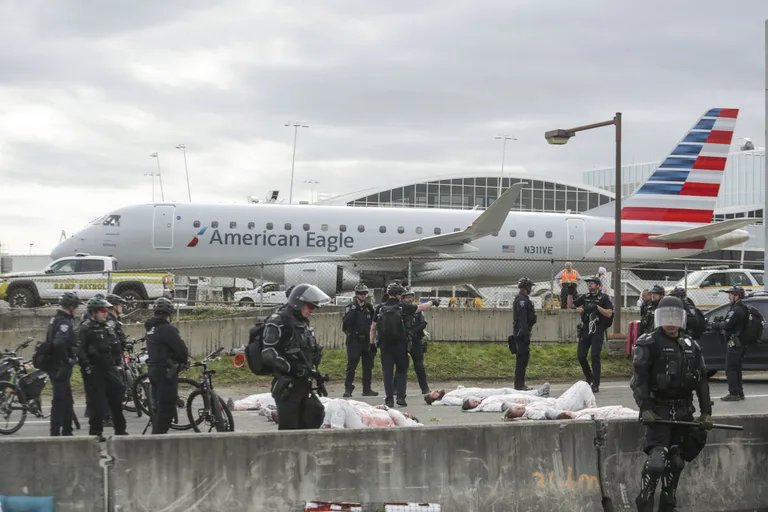The SeaTac City Attorney’s Office has charged 46 people with misdemeanors less than 24 hours after police arrested them during a pro-Palestinian protest that blocked rush hour traffic outside Seattle-Tacoma International Airport, according to city spokesperson Kyle Moore.
Port of Seattle police referred the misdemeanor charges of disorderly conduct and failure to disperse to the City Attorney’s Office. The arrestees will be sent a summons for their court arraignments within four weeks, Moore said.
All of the arrestees were released from jail after making $500 bail, he said.
Thirty people were booked Monday night into the South Correctional Entity jail, or SCORE, in Des Moines about 2 miles south of the airport, and 16 others were booked into the King County Jail, said King County Prosecuting Attorney’s Office spokesperson Casey McNerthney.
None of the arrestees are currently facing felony charges, McNerthney said.
Demonstrators blocked the expressway leading to the airport’s terminal and passenger drop-off area for three hours as part of what organizers called a “global call for an economic blockade” on April 15, Tax Day, demanding an end to the Israel-Hamas war.
An email from organizers pointed to Alaska Airlines’ partnership with Boeing, which supplies planes and other military equipment to the Israel Defense Forces.
The demonstration led to as many as 24 flight delays, the majority of which were under 20 minutes, Cooper said. Two international flights to Qatar and Tokyo were delayed over an hour because their crews were caught in the traffic blockage, he said.
Airport “stakeholders,” including the Transportation Security Administration, FBI and police officials and people working in airport customer service, operations and maintenance, met about a month ago to prepare for a similar situation, Cooper said.
“We know this type of blockage to entranceways to airports had been happening earlier this year, so we had done a scenario planning specifically to address that,” he said. “For folks that are impacted, that’s not what anybody wants for a travel experience, but we managed it in a way that it was handled to safely remove the protesters, remove the block of vehicles and get people exited out as quickly and efficiently as possible.”
The same stakeholders will have another meeting to discuss how they can improve their response to a similar demonstration in the future, Cooper said.
Seattle Times staff reporters Caitlyn Freeman and Lauren Girgis contributed to this report.
